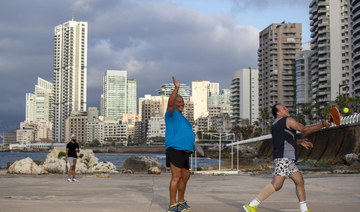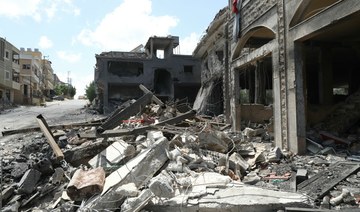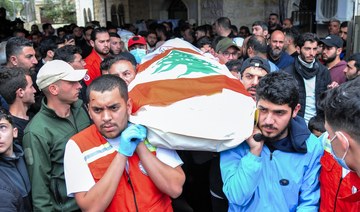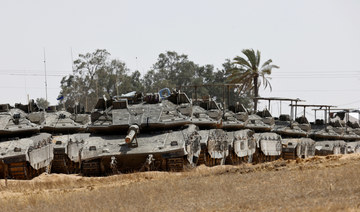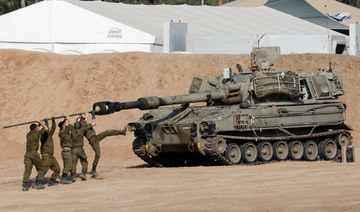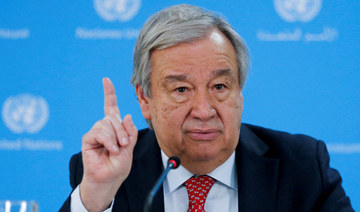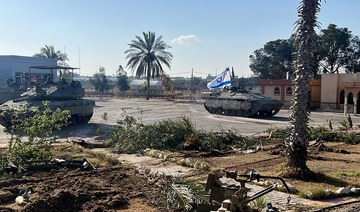BEIRUT: Lebanon eased restrictions on social distancing on Monday, allowing barbershops to open for haircuts for the first time in weeks.
Habib Khalifa, a 40-year-old salon owner in Beirut, told Arab News that he had received clients “who had not had a hair cut for 50 days — this is the first time in my career that I have received this number of men whose hair was so long. Some of them had misshapen (hair) because their wives gave them haircuts during home isolation!
“We applied strict preventive measures, and a rigorous sterilization process,” he added.
“Our work does not include shaving because it has not been included yet in the circulars for the gradual reduction of isolation procedures.”
Many restaurants have also reopened their doors, setting opening times between 9 a.m. and 9 p.m. The Ministry of Interior required that restaurants fill only 30 percent of their capacity, to maintain a safe distance between customers.
As with barbers, restaurants have struggled due to the collapse of the Lebanese pound.
Khalifa said: “Today I did not charge the clients with a higher price — they are unable to pay, nor am I able to keep the old prices because the prices of all the materials that I use have vastly increased.”
The high prices are due to the fact that the US dollar now has a purchase price of 3,900 Lebanese pounds ($2.56), and sells for LBP 4,200. Licensed money exchangers are in the second week of a strike in protest against several arrests for failure to comply with the price set by the Lebanese Central Bank, which values the dollar at LBP 3,200.
People stood in long queues in front of banks across Lebanon on Monday to receive their salaries in Lebanese pounds, at a time when banks themselves have been practicing “haircuts” on their deposits in dollars, in light of the of semi-bankruptcy of the state and financial institutions.
As a result of the collapse of the pound, many business owners have started to raise prices in line with the exchange rate.
The Gas Station Owners Syndicate has asked the minister of energy, Raymond GHajjar, to “fix the price of gasoline due to the heavy losses incurred by the owners of the stations.” The heads of workers’ union and distributors in the gas sector in Lebanon, meanwhile, have demanded royalties for the distribution of domestic gas be raised by LBP 3,000.
The government is awaiting the response of the International Monetary Fund (IMF) to an official request submitted by Beirut to start negotiations on what assistance the IMF can provide Lebanon to tackle its budget deficit, the balance of payments and other vital areas.
The proposals would see Lebanon receive up to $9 billion over several years, in addition to money from donor countries, the World Bank, and Arab and foreign funds that were promised at the Cedar Conference in 2018.
Donors have linked their contributions to reforms, the most important of which is to reduce waste and spending.
On Monday, more than 50 members of parliament gathered during the meeting of the finance and budget committee to listen to an explanation about the government’s reform plan, presented by Finance Minister Ghazi Wazni and Economy Minister Raoul Nehme.
Meanwhile Walid Jumblatt, president of the Progressive Socialist Party, said after his visit to President Michel Aoun on Monday, in light of the party’s dispute with the Free Patriotic Movement: “We seek to organize the conflict, and I am not trying to change the government in this climate of massive misfortune.”
Jumblatt added that “Lebanon’s former economy is finished; services are gone, and the whole world after the coronavirus will change. So will Lebanon.”
The Ministry of Health announced 3 new coronavirus disease cases on Monday, raising the total number of cases to 740. The new patients were all Lebanese returnees from abroad, and remain under home quarantine.
Lebanese — and banks — have ‘haircuts’ after weeks of quarantine
https://arab.news/8um4e
Lebanese — and banks — have ‘haircuts’ after weeks of quarantine

- As a result of the collapse of the pound, many business owners have started to raise prices in line with the exchange rate
Human Rights Watch says Israel attack on Lebanon rescuers was unlawful
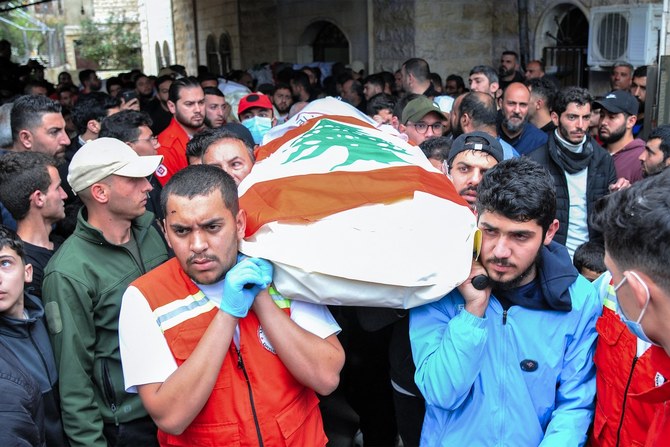
- HRW’s Lebanon researcher Ramzi Kaiss: Israeli forces used a US weapon to conduct a strike that killed seven civilian relief workers in Lebanon who were merely doing their jobs
- Activists from the Gathering of Free University Students organized a demonstration in front of the American University of Beirut campus in support of Palestine and the people of Gaza
BEIRUT: Human Rights Watch on Tuesday said an Israeli strike in Lebanon that killed seven first responders was “an unlawful attack on civilians,” and urged Washington to suspend the sale of weapons to Israel.
“An Israeli strike on an emergency and relief center” in the southern village of Habbariyeh on March 27 “killed seven emergency and relief volunteers,” constituting an “unlawful attack on civilians that failed to take all necessary precautions,” HRW said in a statement.
It said the massacre was committed against “a civil society association that provides emergency services, ambulances, first-aid training, and primary care and relief services in Lebanon.”
Furthermore, HRW said it “did not find any evidence of the presence of military targets at the site that was targeted with the acknowledgment of the Israeli army, which did not take possible precautions to ensure that the target was military … which makes the raid illegal.”
Ramzi Kaiss, HRW’s Lebanon researcher, said: “Israeli forces used a US weapon to conduct a strike that killed seven civilian relief workers in Lebanon who were merely doing their jobs.”
He said the Israeli army used US-made ammunition to carry out the raid.
HRW said it “sent a letter containing the results of reviewing the photos and videos of the site before and after the raid, including a video of the remnants of the ammunition found at the site, and questions to the Israeli army and the US State Department on April 19, but did not receive any response.”
The rights group said it found a metal fragment at the site of the bombing with “MPR 500” written on it, confirming that it is from a 500-pound general-purpose bomb made by Israeli company Elbit Systems, and the fragments and fins are part of a joint direct attack munition set manufactured by American company Boeing.
HRW urged the US to “immediately suspend arms sales and military assistance to Israel given evidence that the Israeli military is using US weapons unlawfully.”
The organization asked Lebanon’s Foreign Ministry to “take immediate action by submitting a declaration to the International Criminal Court, allowing it to investigate crimes falling within its jurisdiction committed on Lebanese territory since October 2023, and prosecute the perpetrators.”
A group of activists from the Gathering of Free University Students organized a demonstration in front of the American University of Beirut campus in support of Palestine and the people of Gaza.
The participants raised a large banner supporting “resistance and boycott until the disintegration of the Israeli entity and the establishment of one Palestine.”
Egypt urges all parties to exert more pressure to end Gaza conflict
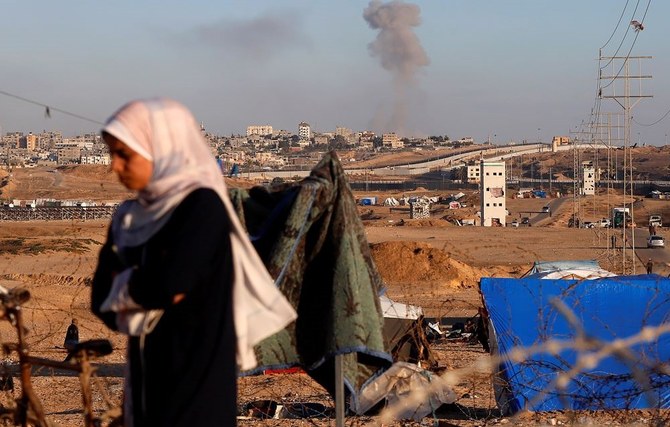
- President Abdel Fattah El-Sisi welcomes progress in recent talks
- Cairo warns Israel that attack on Rafah threatens over 1m in Gaza
CAIRO: Egypt’s President Abdel Fattah El-Sisi has welcomed Monday’s developments in peace talks about finalizing a truce in Israel’s war on Gaza.
El-Sisi said he was “closely following the positive developments pertinent to the ongoing negotiations to reach a comprehensive truce in the Gaza Strip.”
He called on all parties to exert more efforts to reach an agreement that will end the human tragedy of the Palestinian people and finalize the exchange of hostages and prisoners.
Hamas accepted an Egypt-Qatar mediated ceasefire proposal on Monday. The high-stakes diplomatic moves and military brinkmanship left a glimmer of hope alive — but only barely — for an accord that could bring at least a pause in the seven-month-old war that has devastated the Gaza Strip.
An armed conflict between Israel and Hamas-led Palestinian militant groups has been taking place chiefly in and around the Gaza Strip since Oct. 7. It began when Hamas launched a surprise attack on southern Israel from the Gaza Strip, killing around 1,200 people and taking 150 hostages.
Subsequent Israeli strikes against Gaza have driven around 80 percent of the territory’s population of 2.3 million from their homes and caused vast destruction to apartments, hospitals, mosques and schools across several cities.
The Palestinian death toll in Gaza has soared to more than 34,500 people, according to local health officials.
Meanwhile, Egypt’s Foreign Ministry said that it has warned of the dangers of a possible Israeli military operation in Gaza’s Rafah region, “since this escalatory act entails grave humanitarian dangers threatening more than 1 million Palestinians residing in this region.”
It called on Israel to exercise “utmost restraint, and refrain from further escalation at this extremely sensitive timing of ceasefire negotiations, spare the lives of Palestinian civilians who have been enduring an unprecedented humanitarian catastrophe since the outbreak of the war.”
It said that Egypt continues talking with all parties to prevent the situation from deteriorating.
Meanwhile Egypt’s Foreign Minister Sameh Shoukry discussed the Rafah situation with his UAE counterpart Sheikh Abdullah bin Zayed Al-Nahyan in a phone call.
They exchanged views regarding the possibility of Israeli forces carrying out a military operation in the besieged city.
Shoukry reiterated his warning of the dangers of an Israeli military escalation in Rafah, which is considered the last relatively safe area in the Gaza Strip and refuge for more than a million Palestinians.
The ministers stressed the urgency of reaching a truce agreement that allows for the swapping of hostages and detainees, and ensure a permanent ceasefire.
They agreed to continue talks with various parties to prevent the conflict from spreading to the region.
Hezbollah launches ‘explosive-laden drone’ attack on northern Israel
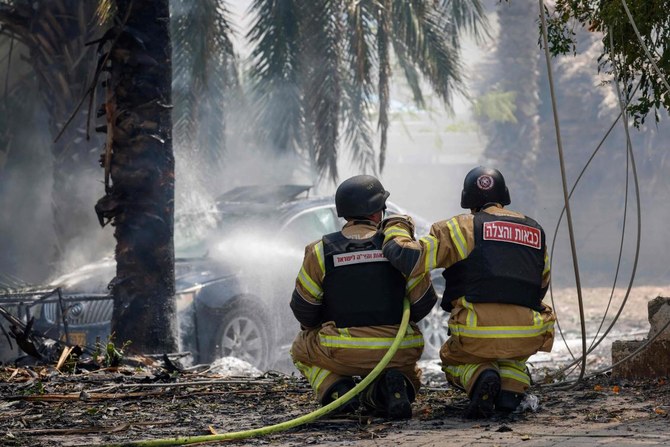
- Hezbollah fighters launched ‘explosive-laden drones targeting enemy soldiers and officers’
- At least 390 people have been killed, in Lebanon, in nearly seven months of cross-border violence
BEIRUT: Lebanon’s Hezbollah said it attacked northern Israel on Tuesday with “explosive-laden drones,” a day after an assault claimed by the Iran-backed movement killed two soldiers there.
Israel and Hezbollah have exchanged regular cross-border fire since Palestinian militant group Hamas’s unprecedented October 7 attack on southern Israel sparked war in the Gaza Strip.
In recent weeks Hezbollah has stepped up its attacks, which it says are in support of Gazans and its ally Hamas, and Israel’s military has struck deeper into Lebanese territory.
Hezbollah fighters on Tuesday launched “explosive-laden drones targeting enemy soldiers and officers,” the group said in a statement.
At the same time, other drones “targeted one of the Iron Dome (air defense system) platforms,” the militants said, adding in separate statements that they carried out other attacks on northern Israel, including with guided missiles.
Israel’s army said on Tuesday that two soldiers had been killed a day earlier in the north.
On Monday, Hezbollah claimed a drone attack on troops near northern Israel’s Metula, with the Israeli military saying “a UAV (drone) was identified crossing from Lebanon” into the area.
In Lebanon, at least 390 people have been killed in nearly seven months of cross-border violence, mostly militants but also more than 70 civilians, according to an AFP tally.
Israel says 13 soldiers and nine civilians have been killed on its side of the border.
Tens of thousands of people have been displaced on both sides.
UN says its access to Gaza’s Rafah crossing ‘denied’ by Israel
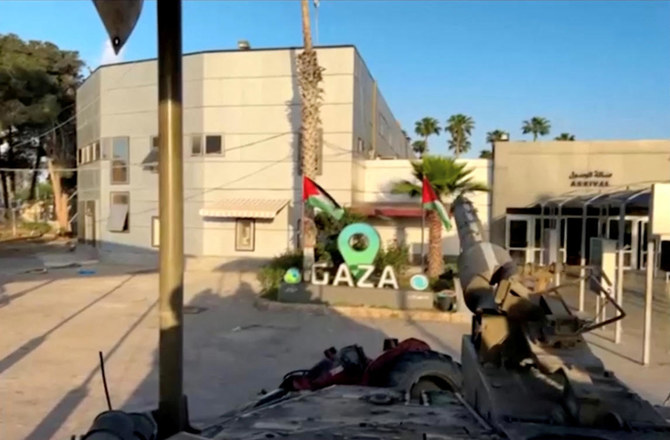
- UN says only has one day of fuel reserves in Gaza
GENEVA: Israeli authorities have denied the UN access to the closed Rafah crossing, the main entry point for humanitarian aid into the Gaza Strip, the United nations said Tuesday .
Jens Laerke, spokesman for the UN’s humanitarian agency OCHA, said there was only a one-day buffer of fuel to run humanitarian operations inside the besieged Palestinian territory.
“We currently do not have any physical presence at the Rafah crossing as our access... has been denied by COGAT,” he said, referring to the Israeli agency that oversees supplies into the Palestinian territories.
“We have been told there will be no crossings of personnel or goods in or out for the time being. That has a massive impact on how much stock do we have.
“There’s a very, very short buffer of one day of fuel available.
“As fuel only comes in through Rafah, the one day buffer is for the entire operation in Gaza.”
If no fuel comes in, “it would be a very effective way of putting the humanitarian operation in its grave,” said Laerke.
“Currently, the two main arteries for getting aid into Gaza are currently choked off,” he said, referring to the Rafah crossing from Egypt and the Kerem Shalom crossing from Israel.
‘Unlike anything we have studied’: Gaza’s destruction in numbers
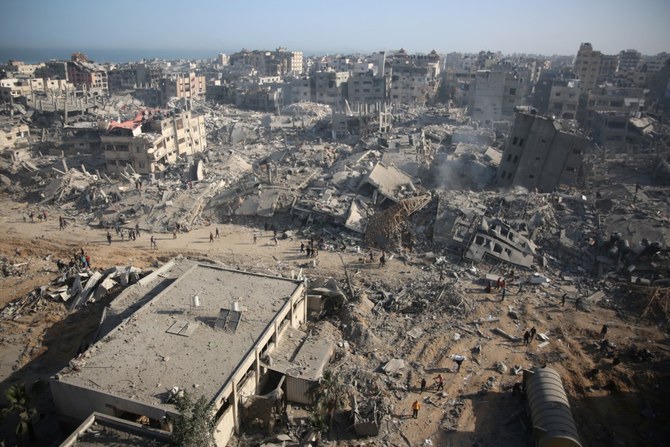
- The level of destruction in northern Gaza has surpassed that of the German city of Dresden, which was firebombed by Allied forces in 1945 in one of the most controversial Allied acts of World War II
Paris: As well as killing more than 34,000 people and causing catastrophic levels of hunger and injury, the seven-month war between Israel and Hamas has also caused massive material destruction in Gaza.
“The rate of damage being registered is unlike anything we have studied before. It is much faster and more extensive than anything we have mapped,” said Corey Scher, a PhD candidate at the City University of New York, who has been researching satellite imagery of Gaza.
As Israel launches an offensive on Rafah, the last population center in Gaza yet to be entered by its ground troops, AFP looks at the territory’s shattered landscape seven months into the war sparked by Hamas’s unprecedented October 7 attack.
Gaza is one of the most densely populated places on the planet, where before the war 2.3 million people had been living on a 365-square-kilometer strip of land.
According to satellite analyzes by Scher and Jamon Van Den Hoek, an associate professor of geography at Oregon State University, 56.9 percent of Gaza buildings were damaged or destroyed as of April 21, totaling 160,000.
“The fastest rates of destruction were in the first two to three months of the bombardment,” Scher told AFP.
In Gaza City, home to some 600,000 people before the war, the situation is dire: almost three-quarters (74.3 percent) of its buildings have been damaged or destroyed.
During the war, Gaza’s hospitals have been repeatedly attacked by Israel, which accuses Hamas of using them for military purposes, a charge the militant group denies.
In the first six weeks of the war sparked by the Hamas attack, which killed more than 1,170 people according to an AFP tally of Israeli official figures, “60 percent of health care facilities... were indicated as damaged or destroyed,” Scher said.
The territory’s largest hospital, Al-Shifa in Gaza City, was targeted in two offensives by the Israeli army, the first in November, the second in March.
The World Health Organization said the second operation reduced the hospital to an “empty shell” strewn with human remains.
Five hospitals have been completely destroyed, according to figures compiled by AFP from the OpenStreetMap project, the Hamas health ministry and the United Nations Satellite Center (UNOSAT). Fewer than one in three hospitals — 28 percent — are partially functioning, according to the UN.
The territory’s largely UN-run schools, where many civilians have sought refuge from the fighting, have also paid a heavy price.
As of April 25, UNICEF counted 408 schools damaged, representing at least 72.5 percent of its count of 563 facilities.
Of those, 53 school buildings have been completely destroyed and 274 others have been damaged by direct fire.
The UN estimates that two-thirds of the schools will need total or major reconstruction to be functional again.
Regarding places of worship, combined data from UNOSAT and OpenStreetMap show 61.5 percent of mosques have been damaged or destroyed.
The level of destruction in northern Gaza has surpassed that of the German city of Dresden, which was firebombed by Allied forces in 1945 in one of the most controversial Allied acts of World War II.
According to a US military study from 1954, quoted by the Financial Times, the bombing campaign at the end of World War II damaged 59 percent of Dresden’s buildings.
In late April, the head of the UN mine clearance program in the Palestinian territories, Mungo Birch, said there was more rubble to clear in Gaza than in Ukraine, which was invaded by Russia more than two years ago.
The UN estimated that as of the start of May, the post-war reconstruction of Gaza would cost between 30 billion and 40 billion dollars.



